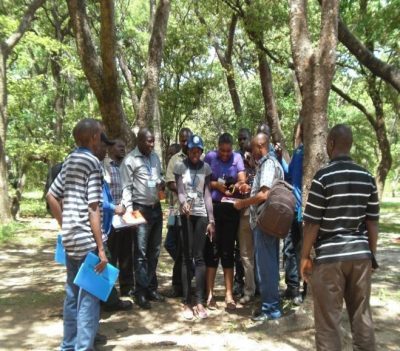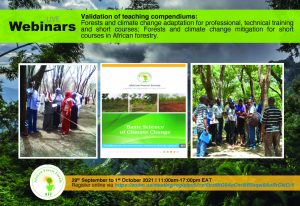REGIONAL WEBINAR FOR VALIDATION OF TEACHING COMPENDIUMS ON:
FORESTS AND CLIMATE CHANGE ADAPTATION FOR PROFESSIONAL, TECHNICAL TRAINING AND SHORT COURSES IN AFRICAN FORESTRY;
FORESTS AND CLIMATE CHANGE MITIGATION FOR SHORT COURSES IN AFRICAN FORESTRY
- Introduction
The African Forest Forum (AFF) is a pan-African non-governmental organization with its headquarters in Nairobi, Kenya. The purpose of AFF is to provide a platform and create an enabling environment for independent and objective analysis, advocacy and advice on relevant policy and technical issues pertaining to achieving sustainable management, use and conservation of Africa’s forest and tree resources as part of efforts to eradicate poverty, promote gender equality, and economic and social development.
AFF, in line with its mandate, is engaged in the development and implementation of projects in close collaboration with a wide range of stakeholders in African forestry. One area of focus has been the relationship between forests, climate change and the people who depend on forest and tree resources. AFF and its stakeholders recognize that forest ecosystems provide goods and services that are key assets for reducing vulnerability of the people to the effects of climate change. Furthermore, AFF recognizes the role forests play in climate change mitigation and adaptation. Based on this premise, AFF advocates that there is a need for creating a platform to catalyze the African forestry stakeholders to understand, strengthen and develop the forest/climate nexus for effective integration in Africa’s development plans.
Since 2011, AFF has been implementing a project on “African forests, people and climate change” that is in its third phase and contributing to the development of a Climate Change Program (AFF-CCP) in the institution. The overall objective of the AFF-CCP is to enhance the role of African forests in making people adapt to the effects of climate change in various landscapes in ways that will improve livelihoods, sustain biodiversity and secure the quality of the environment, as well as to strengthen the capacity of Africa’s forests to adapt to climate change and to contribute to mitigation efforts. The importance of building capacity towards an effective approach to address issues related to climate change, as well as to improve the quality of knowledge transfer was recognized since the first phase of the project (2011 -2014) through two of its objectives namely, building and improving capacity to address forest related climate change issues; and ensuring that production, adaptation, mitigation and policy processes involving forests and trees are backed by sound information. These objectives were further strengthened during the second phase through the development of training modules and compendiums to guide the capacity building process.
One of the specific objectives of this third phase of the project is to strengthen the capacity of African forestry stakeholders in adopting best practices that integrate both adaptation and mitigation options in response to the impacts of climate change and variability to biophysical and social systems in different landscapes. This concept note is anchored on this specific objective with the expected key output being on capacity of African forestry stakeholders in addressing climate change adaptation and mitigation at all levels strengthened.
- Background
The vulnerability of rural households to climate change in Africa is attributed, not only, to exposure to climate variability and extreme weather events, but also, to a combination of social, economic, and environmental factors. There is growing evidence that climate change is affecting forest resources in Africa, and consequently the livelihoods of forest-dependent communities. The effect on the forest resource is exacerbated by increased dependance of vulnerable communities on forest-based goods and services which are often overexploited. In operationalizing the Paris Agreement on climate change through Nationally Determined Contributions (NDCs), many countries have indicated their forests as carbon sinks. There is consensus on the potential role of forests and trees in addressing climate change through mitigation and adaptation; and the sector has, consequently, gathered pace and is being targeted by many funding institutions / mechanisms.
Despite most countries in Africa being the most vulnerable to climate change and variability, taking forest-based adaptation and mitigation to scale is challenged by the lack of sound evidence on best practices specific to different forest ecosystem types. The national governments, civil society organizations, extension agents and local communities are main stakeholders in the implementation of adaptation and mitigation activities implicit in many climate change strategies. They also contribute to widely disseminate relevant research results to local communities who, in the majority, are and will be affected by the adverse effects of climate change. It is crucial that these categories of stakeholders are aware of mechanisms to reduce poverty through their contribution to solving environmental problems. Therefore, training and updating their knowledge and skills is one of the logical approaches to achieve this important outcome.
As part of the efforts to contribute to capacity building for addressing the adverse effects of climate change, AFF during the period 2011-2014 conducted a training needs assessment involving key stakeholders dealing with these issues. Based on the outcomes of the assessment, AFF developed four training modules for professional, technical and short courses (i.e., for extension agents, civil society and local communities) in Sub-Saharan African forestry, two of which were on forests and climate change adaptation, and on forests and climate change mitigation. The modules were shared through sub-regional training workshops in collaboration with selected national institutions. These training events aimed to better orient and re-tool academicians and researchers, as well as staff from extension and civil society organizations from francophones and Anglophone African countries on key areas of science and practice of climate change that relate to forests.
These modules are available on:
As a response to the shared modules, a request emerged on the need to have the content, for each module, better developed in a pedagogical manner in order to improve the delivery of the information in relevant education and training institutions. It is in this context, that AFF, during the second phase of the project (2015-2018), developed eight training compendiums which were launched during the celebration of its tenth anniversary in 2019 and which are being widely distributed in different networks, platforms, media and fora.
In the perspective of continuing such development for the other training modules in the current third phase of the project, AFF contracted two experts in 2019, one to develop three contextualized teaching compendiums, in a pedagogical manner, on “Forests and climate change adaptation for professional, technical training and for short courses in African forestry, and another one on “Forests and climate change mitigation for short course in African forestry”. The draft compendiums have been submitted for external review and strengthened by twenty African forestry experts who have found them suitable for validation.
It is within this context that AFF in its annual work plan for 2021, is organizing a regional webinar aimed at the authentication of the training compendiums before wider circulation and use among African forestry stakeholders.
3. Objectives of the validation webinar
The overall objective of the validation webinar is to authenticate the training compendiums on forests and climate change adaptation for professional and technical training, and short courses as well as the one on forests and climate change mitigation for short courses in African forestry. Specifically, the workshop participants/experts will:
- Evaluate and build on review comments received from experts who assessed the extent to which the contents developed in the training compendiums conform to the current and future needs for each target group.
- Evaluate and build on the experts’ views on the relevance of the compendium content in addressing the capacity needs of the African forestry stakeholders to handle climate change issues.
- Examine and improve on the experts’ assessment of the pedagogical flow in each of the developed training compendiums as well as any recommendations they made.
- Review all new areas proposed by the experts for integration in the draft training compendiums and assess their relevance and
- Identify any new and emerging areas that could necessitate development of other training compendiums in the near future.
- Expected outputs
- Validated training compendiums for professional, technical training and short courses on forest and climate change adaptation, and another one for short courses on forests and climate change mitigation in African forestry;
- New and emerging areas that required development of training compendiums in the future documented; and
- Workshop report.
- Webinar approach and duration
The webinar will be conducted virtually using zoom platform over a duration of 3 days from the 29th September to the 1st October 2021. For each compendium, one working session and one group work session will be organised to harmonise the review comments on the structure and the content, and thereafter validate the final version of the training manual, for a total of four working sessions and four group work sessions during the 3 days webinar.
- Participants
The event is expected to draw about 40 experts from research organizations, academia (technical forestry colleges and Universities). These will include the twenty experts involved in reviewing the compendiums, ten invited resources persons and the secretariat staff.
However, for better contextualization of the training compendiums, African stakeholders from public forestry administration, non-governmental organizations, youth and women-based groups working on climate change, forestry, and related issues are cordially invited to register and participate through the following link: https://zoom.us/meeting/register/tJcsf-6trzMtG9AeCmWff5sqw9AoRrCkICrY
The detailed programme and logistic information on the webinar will be communicated in due time.
Reference materials


